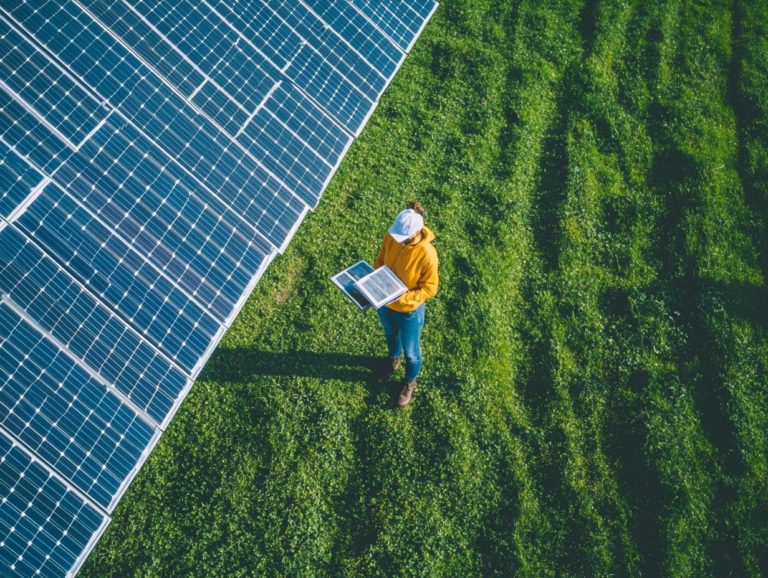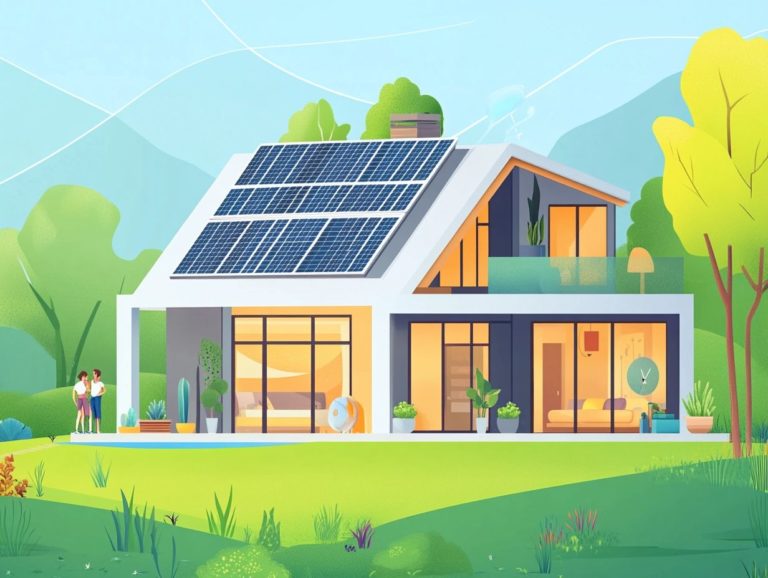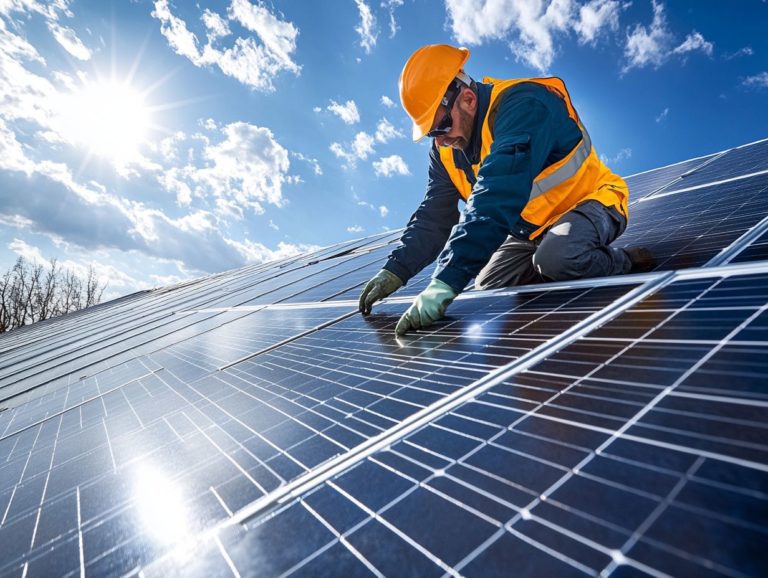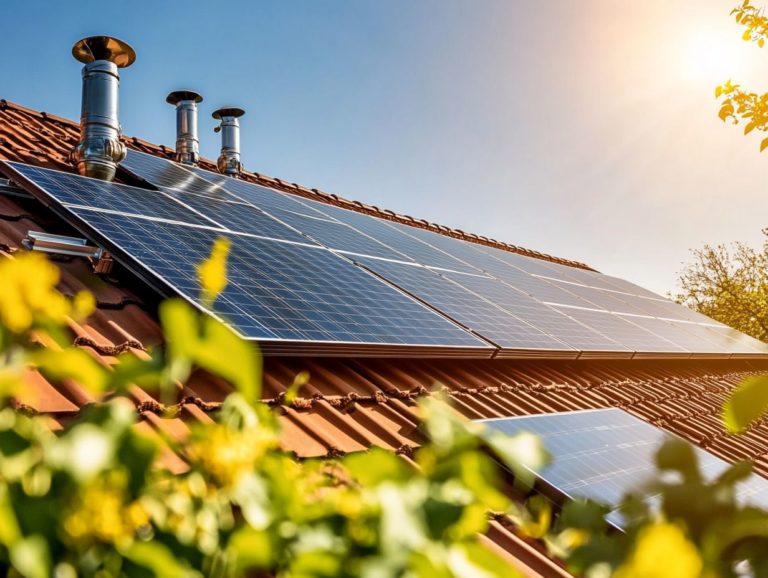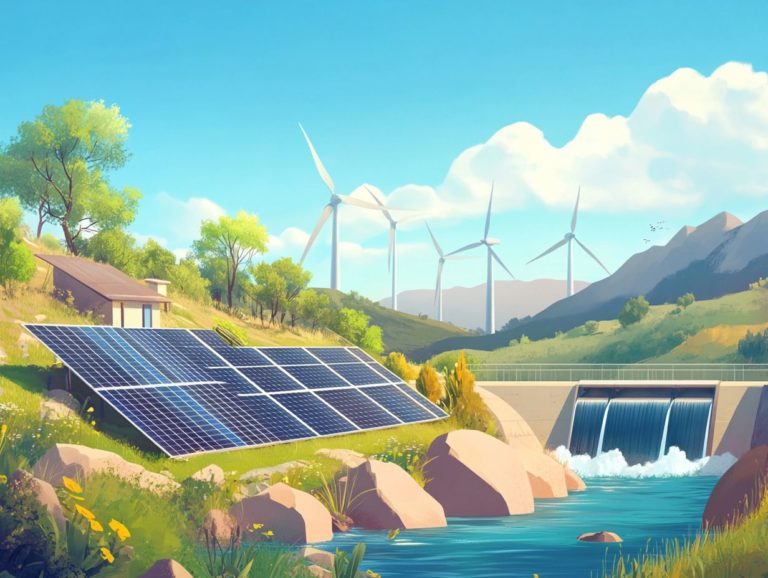“5 Ways to Reduce Your Solar Energy Costs”
Considering a transition to solar energy? You re in good company. With energy costs on the rise and an increasing emphasis on sustainability, countless homeowners are discovering the potential of harnessing solar power.
This article delves into five impactful strategies for reducing your solar energy expenses. These strategies range from installing solar panels on your roof to investing in energy-efficient appliances. It also addresses common questions about solar energy, including its environmental benefits and potential savings.
Get ready to brighten your financial future with solar power!
Contents
Key Takeaways:
Here are the main points to remember about reducing your solar energy costs:

Installing solar panels can significantly reduce your energy costs by using the sun’s natural energy to power your home. Solar energy storage systems allow you to store excess energy for later use, helping you save even more on electricity bills. Government incentives, such as tax credits and rebates, can make the initial cost of solar panel installation more affordable.
1. Install Solar Panels on Your Roof
Installing solar panels on your roof is a transformative investment. You ll enjoy substantial energy savings and reduced electricity bills. Your property value may also increase while you support renewable energy.
While the installation process may appear straightforward, it’s essential to engage professionals and certified contractors to ensure optimal performance and compliance with local regulations.
There are two types of solar panels: monocrystalline and polycrystalline. Monocrystalline panels are typically more efficient, with rates around 20-22%. This efficiency translates into significant energy savings that allow you to fully capitalize on your investment.
Not only do solar panels increase your property value, but they also play a crucial role in fostering environmental sustainability. They help reduce reliance on fossil fuels and lower greenhouse gas emissions.
2. Utilize Solar Energy Storage Systems
Utilizing solar energy storage systems enables you to maximize your energy savings. These systems capture excess solar power for use during peak electricity rates. This strategy mitigates high energy costs and enhances your overall energy efficiency.
These systems come in various forms, including lithium-ion batteries, lead-acid batteries, and innovative technologies like flow batteries and thermal storage. Each type offers distinct advantages, such as different capacities, lifespans, and costs, allowing you to select an option that aligns with your energy needs.
By storing energy generated on sunny days, these systems provide a reliable power source during low solar output. This contributes to grid stability as well. Integrating these storage solutions with your solar panels can lead to substantial savings, reducing dependence on the grid and lowering your electricity bills.
3. Take Advantage of Government Incentives
By taking advantage of government incentives like tax credits and rebates, you can significantly enhance the financial returns on your investment in solar energy systems. This makes solar an appealing option for cutting operational costs and securing long-term energy savings.
For example, in California, you can benefit from the California Solar Initiative, which provides substantial rebates based on the size of the solar system you install. If you’re in New Jersey, you can access unique incentives like Solar Renewable Energy Certificates (SRECs), allowing you to earn income while generating solar energy.
Meanwhile, Texas offers a variety of local and federal tax credits, including the Investment Tax Credit (ITC), which can cover a considerable portion of your initial installation costs.
By tapping into these diverse incentives, you can effectively lower your upfront expenses while boosting your overall savings. This makes solar energy a more accessible and attractive alternative for you.
Start your solar journey today and enjoy the savings!
4. Invest in Energy-Efficient Appliances
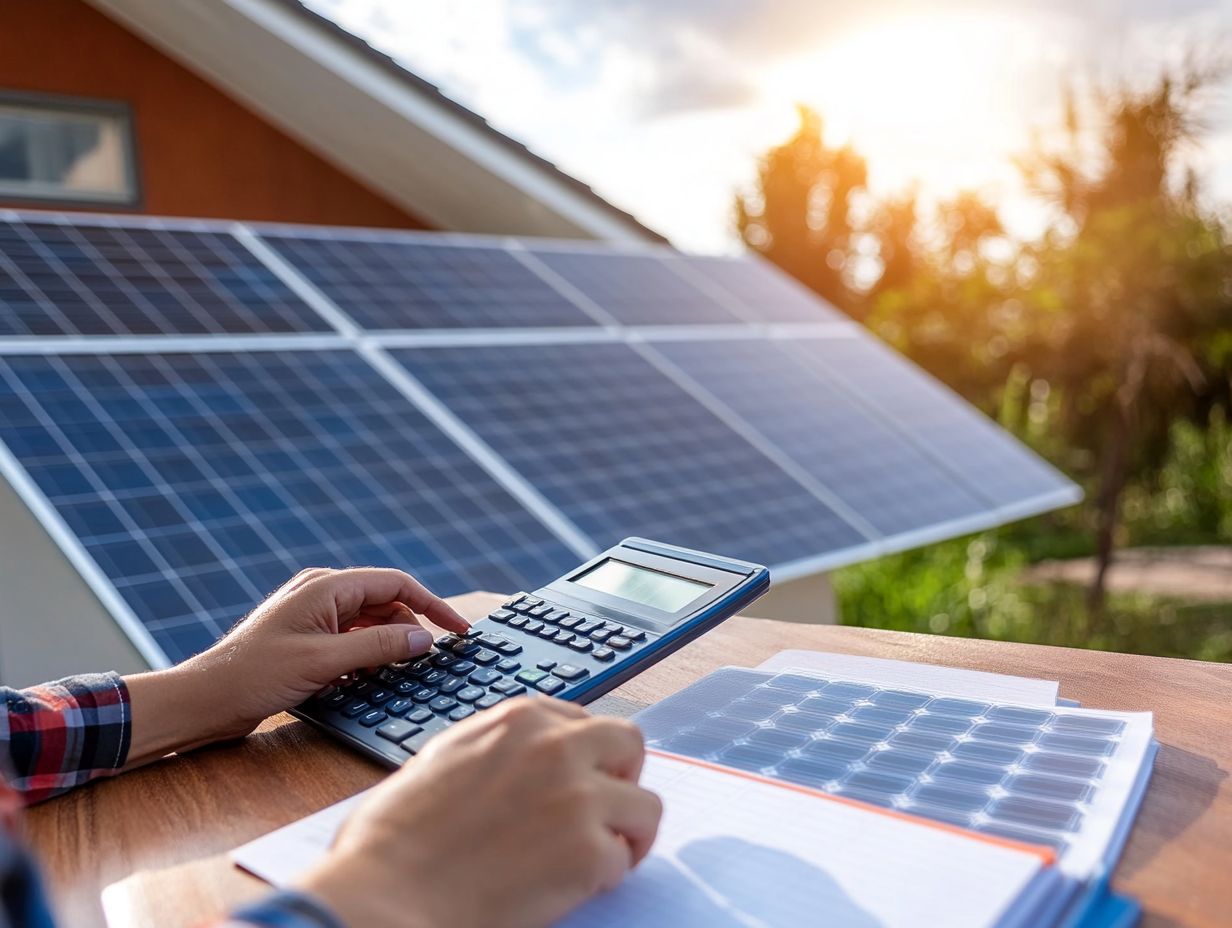
Investing in energy-efficient appliances isn’t just a smart financial move; it significantly reduces your energy usage and cuts monthly costs. It also plays a vital role in cultivating a sustainable energy future.
By choosing options that align with initiatives like EnergyStar, you’re embracing technology that minimizes environmental impact.
Efficient HVAC systems leverage advanced technology to optimize performance. This ensures your indoor climate remains comfortable without excessive energy consumption.
Pairing these systems with programmable thermostats gives you the power to customize your heating and cooling schedules. This maximizes energy savings by adjusting temperatures based on when your space is occupied.
This intelligent control enhances your comfort and can cut your utility bills. Incorporating these appliances into your home improves efficiency and helps the planet!
5. Implement Energy-Saving Habits
Implementing energy-saving habits into your daily routine can significantly enhance your electricity consumption. This leads to meaningful reductions in energy expenses for both your home and business.
By making small yet impactful adjustments, you create a more environmentally friendly living or working space. For example, switching to energy-efficient lighting options, like LED bulbs, consumes less electricity and lasts longer.
It’s also crucial to turn off or unplug devices when they’re not in use. Many devices continue to draw power even in standby mode.
For heating and cooling systems, optimizing your thermostat settings and ensuring proper insulation can drastically reduce energy usage. This helps maintain a comfortable environment without facing exorbitant utility bills.
How Much Can You Save with Solar Energy?
Understanding how much you can save with solar energy involves diving into several key factors: installation costs, your energy consumption patterns, and the available rebates. These elements will shape your financial returns and long-term savings on energy bills.
Different properties whether single-family homes or larger commercial buildings illustrate how these variables can lead to vastly different savings outcomes. For example, if your home has ample roof space for solar panels, you may find yourself reaping significant benefits from net metering, a way to get credit on your bill for extra energy you create.
The advantages become even more pronounced for businesses operating during peak daylight hours, maximizing savings from solar energy. As time goes on, you ll likely notice a marked reduction in your utility bills, reinforcing the long-term economic benefits of choosing renewable energy solutions.
What Are the Different Types of Solar Panels Available?
When considering solar panels, you ll find various options available, including monocrystalline and polycrystalline photovoltaic systems. Each type brings different efficiency levels and installation costs.
Monocrystalline panels are your high-efficiency champions, converting more sunlight into electricity. They’re perfect for those tight spaces where roof area is limited.
On the flip side, polycrystalline panels are generally less efficient but come at a more budget-friendly price, making them ideal for larger installations where space isn t a concern.
Your choice between these two can significantly impact both your installation expenses and your potential long-term energy savings. Don t overlook thin-film solar panels either; while they may be less efficient, their lightweight and flexible nature allows for innovative mounting solutions.
Each type plays a crucial role in the broader conversation about sustainable energy solutions. Understanding their nuances gives you the ability to make the best decision for your needs.
What Are the Maintenance Costs for Solar Panels?
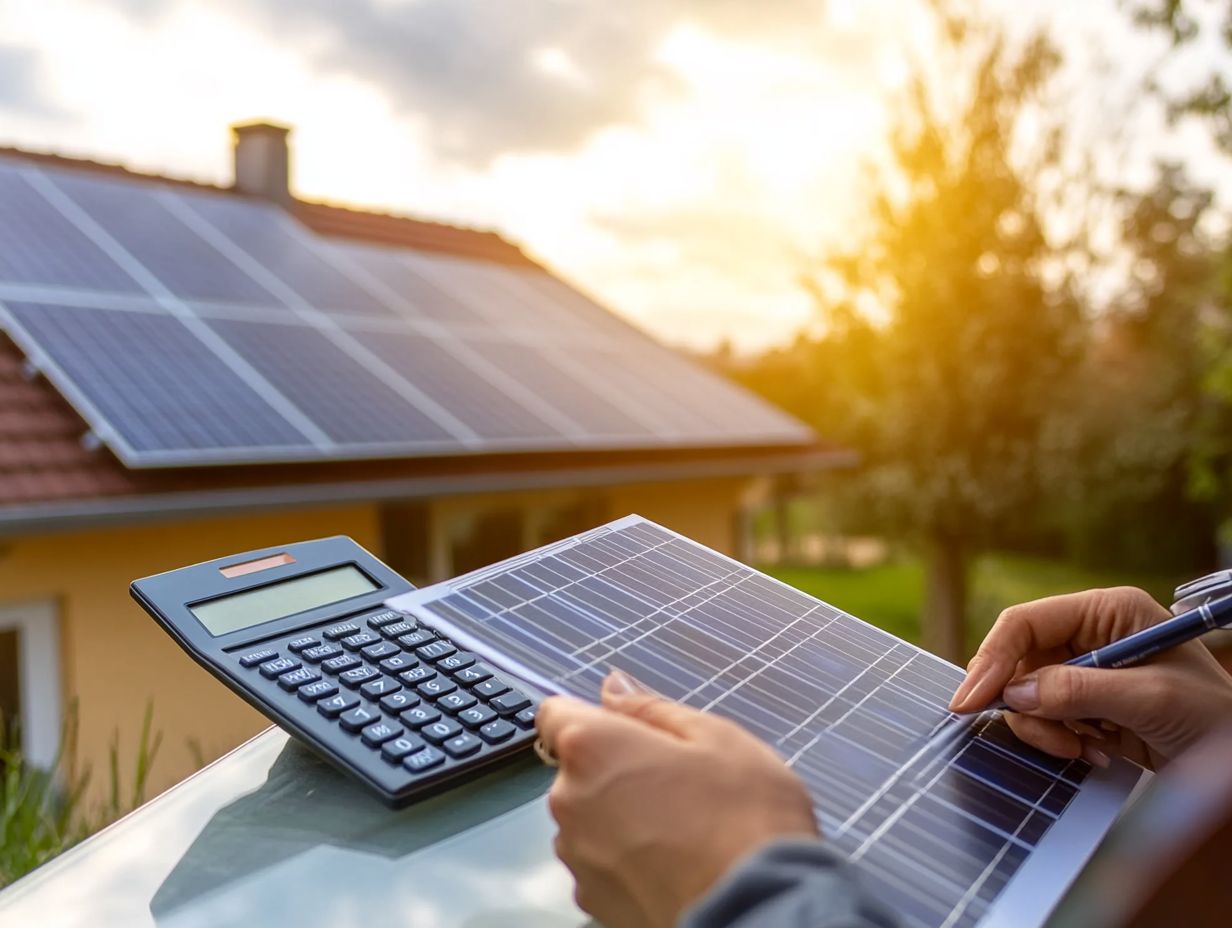
Understanding the maintenance costs for solar panels is essential for homeowners and business owners. Regular upkeep ensures optimal efficiency and longevity while significantly impacting the overall financial returns on your solar investment.
Consider this: routine inspections identify wear and tear, cleaning eliminates dirt and debris, and occasional repairs play an important role in maintaining peak performance. While these maintenance tasks may involve some costs, they can enhance your energy output and effectively offset your initial investment over time.
Engaging qualified contractors for these jobs is crucial. Professional technicians bring expertise that guarantees effective work and protects you from future issues.
Their knowledge can help catch minor problems before they escalate, preserving the lifespan of your solar panels and maximizing the benefits of harnessing solar energy.
What Are the Common Misconceptions About Solar Energy?
Common misconceptions about solar energy can often stand in the way of potential investments. Myths surrounding costs, efficiency, and environmental concerns lead to misunderstandings about its viability and benefits.
You might think that solar panels are prohibitively expensive and require a hefty upfront investment. However, advances in technology have significantly lowered these costs, making solar energy more accessible than ever.
The efficiency of solar panels has improved remarkably over the years. They serve as a reliable energy source even when the weather isn t cooperating.
Concerns regarding the environmental impact of manufacturing solar panels are prevalent. When you weigh the long-term benefits of clean energy generation against fossil fuels, you’ll quickly see why solar energy is such a game-changer.
By dispelling these myths, you can fully appreciate solar energy’s role as a sustainable alternative that not only reduces carbon footprints but fosters energy independence.
How Can You Determine If Solar Energy Is Right for Your Home?
Determining if solar energy is the right option for your home begins with a comprehensive energy audit to evaluate your consumption patterns. It is advisable to consult professionals who can assess potential savings and system requirements tailored to your needs.
Start with a careful examination of your roof’s conditions. Factors like orientation, angle, and shading can greatly influence solar efficiency. Additionally, review your energy bills from the past year to identify usage trends and peak consumption periods.
This information is invaluable for estimating the size of the solar system you’ll need. Interacting with solar energy consultants can illuminate local incentives and regulations, ensuring you explore all possibilities.
By analyzing these elements, you can make informed decisions that align your energy needs with the numerous benefits of solar energy.
What Are the Environmental Benefits of Using Solar Energy?
The environmental benefits of using solar energy are truly remarkable. By embracing this clean and renewable energy source, you reduce reliance on fossil fuels, cut greenhouse gas emissions, and foster sustainability within your community.
When you harness the power of the sun, you significantly decrease air and water pollution. This helps nurture healthier ecosystems. This transition to solar energy not only combats climate change but also aligns with global sustainability goals, ensuring that future generations can thrive on a planet rich in natural resources.
Using solar technology also boosts local economies by creating jobs and encouraging investment in green infrastructure. This ultimately leads to vibrant, resilient communities that prioritize environmental stewardship all thanks to your commitment to a greener future.
Frequently Asked Questions
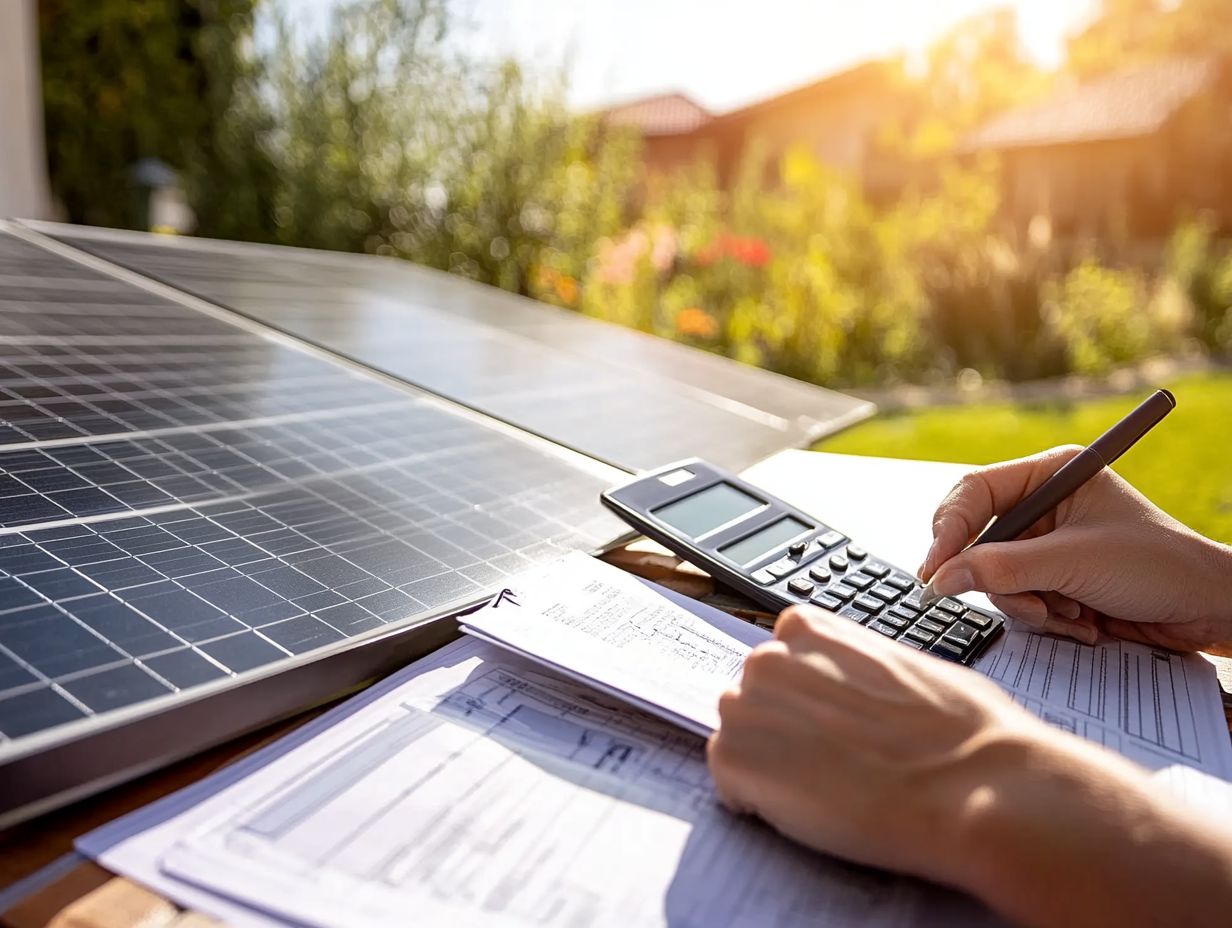
How can I reduce my solar energy costs?
There are many ways to reduce your solar energy costs. Here are five effective strategies to get you started:
- Consider installing energy-efficient appliances to lower overall demand.
- Take advantage of government incentives and tax credits aimed at solar installations.
- Regular maintenance can prevent costly repairs down the line.
- Consider community solar programs if installation on your property isn’t feasible.
- Shop around for competitive quotes from multiple solar providers.
What is the first step in reducing my solar energy costs?
Start by assessing your energy usage. Understanding your needs helps you choose the right size and type of solar system for your home.
Can I lower my solar energy costs by installing a smaller system?
Yes, a smaller system can indeed reduce costs. Just ensure it meets your energy needs!
How can I make my home more energy-efficient?
Improve energy efficiency by using energy-saving appliances and installing energy-efficient windows.
Consider adding insulation and switching to LED lighting.
Are there government incentives or rebates available?
Absolutely! Many governments offer incentives and rebates for homeowners who install solar systems.
It’s worth exploring what’s available in your area!
Can I negotiate with solar installers?
Yes, you can negotiate for better rates. Don’t hesitate to shop around and compare quotes to secure the best deal!

